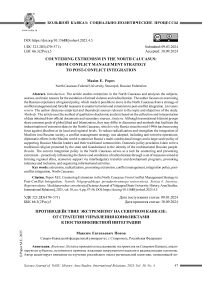Countering Extremism in the North Caucasus: From Conflict Management Strategy to Post-Conflict Integration
Автор: Popov M.E.
Журнал: Вестник ВолГУ. Серия: История. Регионоведение. Международные отношения @hfrir-jvolsu
Рубрика: Большой Кавказ: социально-политические процессы
Статья в выпуске: 4 т.30, 2025 года.
Бесплатный доступ
Introduction. The article studies extremism in the North Caucasus and analyzes the subjects, sources, and main reasons for the escalation of armed violence and radicalization. The author focuses on examining the Russian experience of regional policy, which made it possible to move in the North Caucasus from a strategy of conflict management and forceful measures to counter terrorism and extremism to post-conflict integration. Literature review. The author discusses empirical and theoretical sources relevant to the topic and objectives of the study. Methods. The article uses the method of qualitative diachronic analysis based on the collection and interpretation of data obtained from official documents and secondary sources. Analysis. Although transnational Islamist groups share common goals of global jihad and Islamization, they may differ in discourses and methods that facilitate the indoctrination of extremist ideas in the North Caucasus, which is why Russia since the mid-1990s has been using force against jihadism at its local and regional levels. To reduce radicalization and strengthen the integration of Muslims into Russian society, a conflict management strategy was adopted, including anti-terrorist operations; diplomatic efforts in the Muslim world to optimize Russia’s multi-confessional image; and a large-scale policy of supporting Russian Muslim leaders and their traditional communities. Domestic policy proclaims Islam to be a traditional religion protected by the state and foundational to the identity of the multinational Russian people. Results. The current integration policy in the North Caucasus serves as a tool for countering and preventing extremism – proactively influencing the factors and conditions of radicalization through a set of measures aimed at forming regional elites, economic support via interbudgetary transfers and development programs, promoting tolerance and inclusion, and organizing informational activities.
Extremism, radicalization, preventing extremism, conflict management, integration policy, postconflict integration, North Caucasus
Короткий адрес: https://sciup.org/149149137
IDR: 149149137 | УДК: 323.283(470+571) | DOI: 10.15688/jvolsu4.2025.4.5
Текст научной статьи Countering Extremism in the North Caucasus: From Conflict Management Strategy to Post-Conflict Integration
DOI:
Цитирование. Попов М. Е. Противодействие экстремизму на Северном Кавказе: от стратегии управления конфликтами к постконфликтной интеграции // Вестник Волгоградского государственного университета. Серия 4, История. Регионоведение. Международные отношения. – 2025. – Т. 30, № 4. – С. 47–56. – (На англ. яз.). – DOI:
Introduction. Historically, ethnopolitical and religious factors are intertwined in the North Caucasus, often masking each other. The bloodiest ethnic war in the region, the Chechen conflict, began as an ethno-secessionist conflict but soon transformed into religious extremism, with radical Islamism becoming the leading factor in the violence. Ethno-religious violence in the North Caucasus includes a wide range of regional phenomena and intensifies territorial and cultural contradictions. Long-standing regional conflicts in the North Caucasus can be divided into three interdependent types: intra-regional territorial conflicts; separatist conflicts between regional communities and the federal government; and ethno-religious extremism associated with the ideologies and practices of jihadism and radical Islamism in their regional refraction [21]. The North Caucasus region is of geostrategic importance for Russia and is within the sphere of its key national interests. Russia is interested in strengthening its position in the multi-ethnic region, ensuring the security of its southern borders, stabilizing the internal situation, and strengthening regional integration. To determine the goals and priorities of the geopolitical strategy and its compliance with changing regional realities, a comprehensive study of ethnoreligious processes in the North Caucasus is necessary. This is especially important in the context of the large-scale fight against global terrorism, when the possibility of effectively implementing an antiterrorist strategy and constructively resolving ethnoreligious contradictions largely depends on the stability and regional integration. Establishing political control over the North Caucasus occupied a central place in the 2000 presidential program, remained the most important federal task addressed by the government before the 2004 elections, and was declared a major success of the administration during the 2012 and 2018 presidential campaigns. Further implementation of the regional integration policy means that Russia is moving in the North Caucasus from a conflict management strategy to post-conflict integration.
Methods and materials. The author employs a comprehensive methodological approach. First, a historical and political analysis is conducted on the sources, subjects, and factors of radicalization in the North Caucasus during the post-Soviet decades. This analysis draws on data obtained from federal and regional media, analytical reports from research centers, official documents (such as the Strategy for Countering Extremism in the Russian Federation until 2025 and the Comprehensive Plan for Countering the Ideology of Terrorism in the Russian Federation for 2024–2028), and academic studies by both domestic and foreign scholars. Second, a diachronic study examines efforts to counter extremism and methods of deradicalization in the North Caucasus through an analysis of political events in the region from the collapse of the USSR to the present day. Diachronic analysis involves dividing sociohistorical processes into a sequence of stages and phases, which are considered within the broader context of historical developments. In the context of the subject of the research, the author highlights the essential temporal changes in historical reality (I.D. Kovalchenko): 1) 1994– 1996 – the stage of the First Chechen War, the beginning of the “transnationalization” of extremist ideology and terrorist activity (participation of the first foreign jihadists in the conflict); 2) 1999–2009 – the stage of the Second Chechen War, the “jihadization” of the ethnic conflict, the formation of the international terrorist organization Caucasus Emirate, the abolition of the CTO regime, and the combination of conflict management strategy and post-conflict integration; 3) 2010–2015 – a new stage of “jihadization” and “transnationalization” of extremist ideology and terrorist activity of the Caucasus Emirate and the liquidation of the organization; 4) 2016 – present – the stage of fullscale de-escalation of armed violence and further socio-cultural reintegration of the North Caucasus.


